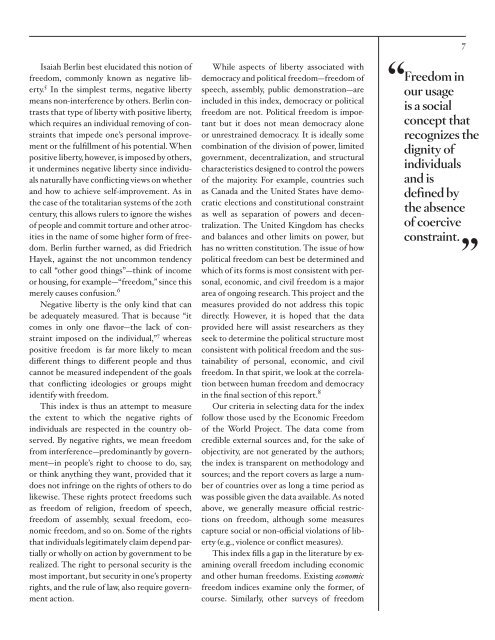P R E L I M I N A R Y R E P O R T
Rc8D1
Rc8D1
You also want an ePaper? Increase the reach of your titles
YUMPU automatically turns print PDFs into web optimized ePapers that Google loves.
Isaiah Berlin best elucidated this notion offreedom, commonly known as negative liberty.5 In the simplest terms, negative libertymeans non-interference by others. Berlin contraststhat type of liberty with positive liberty,which requires an individual removing of constraintsthat impede one’s personal improvementor the fulfillment of his potential. Whenpositive liberty, however, is imposed by others,it undermines negative liberty since individualsnaturally have conflicting views on whetherand how to achieve self-improvement. As inthe case of the totalitarian systems of the 20thcentury, this allows rulers to ignore the wishesof people and commit torture and other atrocitiesin the name of some higher form of freedom.Berlin further warned, as did FriedrichHayek, against the not uncommon tendencyto call “other good things”—think of incomeor housing, for example—“freedom,” since thismerely causes confusion. 6Negative liberty is the only kind that canbe adequately measured. That is because “itcomes in only one flavor—the lack of constraintimposed on the individual,” 7 whereaspositive freedom is far more likely to meandifferent things to different people and thuscannot be measured independent of the goalsthat conflicting ideologies or groups mightidentify with freedom.This index is thus an attempt to measurethe extent to which the negative rights ofindividuals are respected in the country observed.By negative rights, we mean freedomfrom interference—predominantly by government—inpeople’s right to choose to do, say,or think anything they want, provided that itdoes not infringe on the rights of others to dolikewise. These rights protect freedoms suchas freedom of religion, freedom of speech,freedom of assembly, sexual freedom, economicfreedom, and so on. Some of the rightsthat individuals legitimately claim depend partiallyor wholly on action by government to berealized. The right to personal security is themost important, but security in one’s propertyrights, and the rule of law, also require governmentaction.While aspects of liberty associated withdemocracy and political freedom—freedom ofspeech, assembly, public demonstration—areincluded in this index, democracy or politicalfreedom are not. Political freedom is importantbut it does not mean democracy aloneor unrestrained democracy. It is ideally somecombination of the division of power, limitedgovernment, decentralization, and structuralcharacteristics designed to control the powersof the majority. For example, countries suchas Canada and the United States have democraticelections and constitutional constraintas well as separation of powers and decentralization.The United Kingdom has checksand balances and other limits on power, buthas no written constitution. The issue of howpolitical freedom can best be determined andwhich of its forms is most consistent with personal,economic, and civil freedom is a majorarea of ongoing research. This project and themeasures provided do not address this topicdirectly. However, it is hoped that the dataprovided here will assist researchers as theyseek to determine the political structure mostconsistent with political freedom and the sustainabilityof personal, economic, and civilfreedom. In that spirit, we look at the correlationbetween human freedom and democracyin the final section of this report. 8Our criteria in selecting data for the indexfollow those used by the Economic Freedomof the World Project. The data come fromcredible external sources and, for the sake ofobjectivity, are not generated by the authors;the index is transparent on methodology andsources; and the report covers as large a numberof countries over as long a time period aswas possible given the data available. As notedabove, we generally measure official restrictionson freedom, although some measurescapture social or non-official violations of liberty(e.g., violence or conflict measures).This index fills a gap in the literature by examiningoverall freedom including economicand other human freedoms. Existing economicfreedom indices examine only the former, ofcourse. Similarly, other surveys of freedom7“Freedom inour usageis a socialconcept thatrecognizes thedignity ofindividualsand isdefined bythe absenceof coerciveconstraint.”


